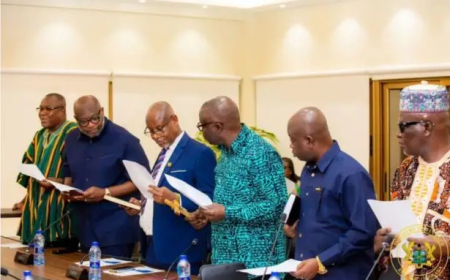Sankofa Series: 10 Companies Kwame Nkrumah Established to Industrialize Ghana
Kwame Nkrumah, Ghana’s first President and a champion of Pan-Africanism, laid the foundation for the country’s industrialization through an ambitious state-led economic agenda. His vision was to transform Ghana from a raw-material-exporting economy into a self-sufficient, industrialized nation. As part of this strategy, Nkrumah spearheaded the establishment of numerous state-owned enterprises across various sectors, aimed at fostering economic independence and reducing reliance on foreign imports. Here are ten notable companies he founded to drive Ghana’s industrialization.

One of Nkrumah’s flagship industrial projects, the Tema Oil Refinery was established to process crude oil locally and reduce Ghana’s dependence on imported petroleum products. The refinery played a crucial role in the energy sector and contributed to the country’s economic self-reliance.
2. Ghana Industrial Holding Corporation (GIHOC)
GIHOC was created as an umbrella organization to oversee multiple industrial ventures, including beverage production, textiles, and pharmaceuticals. It became instrumental in managing Ghana’s growing industrial landscape.
3. Volta Aluminium Company (VALCO)
Although VALCO was officially established after Nkrumah’s overthrow, it was part of his broader industrialization plan linked to the Akosombo Dam. The aluminum smelter was intended to support Ghana’s development of a full-fledged aluminum industry.
4. Ghana Cement Company (GHACEM)
To boost the construction industry and reduce reliance on imported cement, Nkrumah set up GHACEM, ensuring a steady supply of locally manufactured cement for infrastructure projects and national development.
5. Ghana Sugar Estates Limited (GSEL)
With a focus on agro-industrial development, Ghana Sugar Estates was established to cultivate and process sugar locally. The aim was to reduce sugar imports and promote self-sufficiency in food production.
6. GIHOC Glass Factory
As part of efforts to develop a diversified manufacturing sector, Nkrumah founded the GIHOC Glass Factory to produce glass products for domestic use and export. It was an important step toward reducing dependency on foreign-made industrial goods.
7. Bonsa Tyre Factory
Recognizing the potential of Ghana’s rubber industry, Nkrumah established the Bonsa Tyre Factory to manufacture automobile and industrial tires locally. This was meant to support the transport sector and reduce imports.
8. State Fishing Corporation
To boost the fishing industry and enhance food security, Nkrumah founded the State Fishing Corporation. This initiative encouraged large-scale fishing operations and processing facilities to meet domestic demand and promote exports.
9. Nsawam Cannery
Agriculture and food processing were central to Nkrumah’s industrial plan. The Nsawam Cannery was established to process and preserve fruits and vegetables, reducing post-harvest losses and ensuring year-round food availability.
10. Ghana Textile Printing Company (GTP)
To reduce reliance on imported textiles and promote local industries, Nkrumah set up the Ghana Textile Printing Company. It became a key player in the country’s textile sector, providing employment and supporting local fashion.
Legacy and Lessons for Today
Nkrumah’s industrial initiatives were groundbreaking and demonstrated his vision for a self-sufficient Ghana. However, political instability, economic challenges, and policy shifts following his overthrow led to the decline or privatization of many of these enterprises. Today, Ghana continues to revisit its industrialization agenda, drawing lessons from Nkrumah’s bold policies to develop a more resilient and diversified economy.
The Sankofa spirit—learning from the past to build the future—remains relevant as Ghana seeks to revitalize its manufacturing sector and create sustainable economic opportunities for future generations.
What's Your Reaction?



















































































